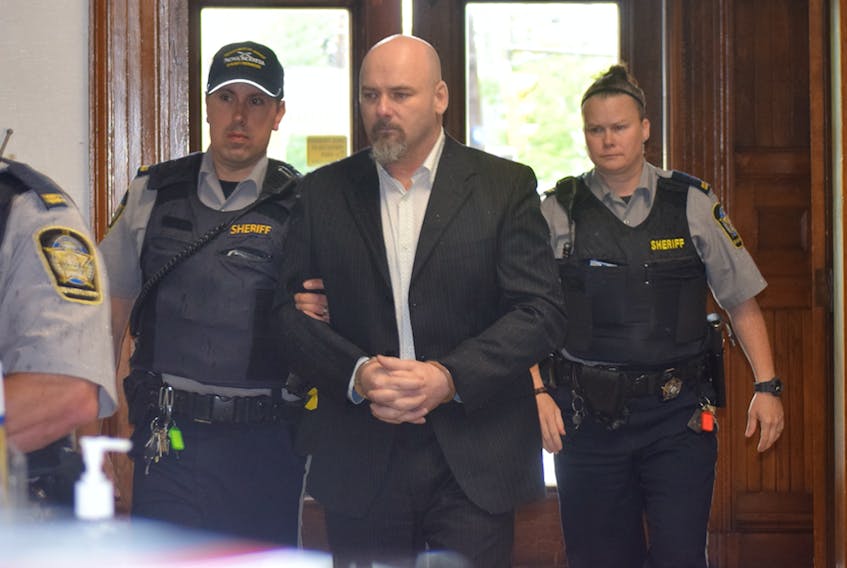Marital issues combined with substance abuse and depression ultimately ended in a downward spiral that led a Bayhead man to fatally shoot his neighbour, a judge said Monday.
“The killing of Ms. (Susan) Butlin was brutal and senseless,” Nova Scotia Supreme Court Justice Jeffery Hunt said during the sentencing of Ernie Ross (Junior) Duggan. “Ms. Butlin lived in fear of Mr. Duggan at the end of her life, which is tragic.”
Duggan, 51, was given a life sentence with no chance of parole for 20 years. He pleaded guilty in June to second-degree murder for Butlin’s death, late on the night of Sept. 17, 2017.
Butlin, 58, died in her Clarks Road home after being struck at close range by a single shotgun blast at the hands of an intoxicated Duggan.
He had previously been ordered by a provincial court judge not to have any contact with Butlin, who had filed a peace bond application against him because of sexual assault allegations.
Chronic depression issues “exacerbated” by an increased use of alcohol and cocaine, however, culminated in the events that led to Butlin’s death.
“Mr. Duggan experienced substance issues on and off throughout his adult life,” Hunt said. “In the final months leading up to the killing of Susie Butlin, these took an even stronger hold of him as financial and marital problems seemed to cause him to spiral downward.”
An agreed statement of facts between the Crown and defence teams, that was made public following Duggan’s guilty plea in June, said he went to Butlin’s house and called out to her, then fired one round from a shotgun at an upward angle when she came to the door.
“Despite his alcohol consumption, the accused knew that firing the shotgun in that direction would either kill Ms. Butlin or cause her bodily harm that was likely to cause her death and he was reckless as to whether her death ensued,” the statement said.
After firing the shot, Duggan walked into the residence and saw Butlin’s body on the floor. He fled, leaving bloody footprints on the steps, and returned to his home where he finished consuming a pint of rum, then gathered his firearms and ammunition and drove off in his truck.
Two German exchange students who were staying with Butlin at the time, and who were familiar with Duggan, were left huddling in fear in their bedroom following the shooting, not knowing whether he was still present or whether they too were in danger.
Following the shooting, Duggan sent text messages to his wife, with whom he now is going through the process of a divorce, indicating that his intention was “to have the police shoot him.”
Duggan was eventually located by the police and led them on a chase to the Lockerbie Cemetery outside Tatamagouche where he became involved in a standoff involving an exchange of gunfire. Evidence revealed in court indicated that he fired four rounds over the officers’ heads.
But Crown attorney Perry Borden said outside the court that the officers certainly felt like they were in danger.
“They didn’t know where the bullets were going. But they heard the bullets going through trees and ricocheting off the ground near them,” Borden said. “They were in fear of their lives for sure.”
The judge also made reference to the impact the standoff with Duggan had on the seasoned officers.
“The circumstances of this event are tragic. I remember being struck at the voir dire with how affected the officers seemed to be, by what they had seen and what they experienced,” Hunt said. “This killing, the aftermath and the standoff clearly impacted them deeply.”
Despite his “monstrous crime,” however, Hunt said Duggan has served as a model prisoner during his incarceration and has demonstrated that he is capable of rehabilitation.
Co-defence attorney David Mahoney told the court that Duggan has “continuously” expressed remorse for his actions and the impact they have had on all involved.
“I’d like to give my most sincere apologies to everyone involved in this tragedy,” Duggan said, prior to being sentenced. “Mrs. Butlin’s family and friends, the officers involved, to the court, to my family and friends.”
Duggan was shot by RCMP officers during the standoff and received a total of seven wounds, the most serious being to his left shoulder.
He has been incarcerated since being arrested and will receive two year’s credit off his parole ineligibility for that time.
A life sentence is mandatory for both first- and second-degree murder with a maximum of 25 years before parole eligibility. And while the 20-year ineligibility imposed on Duggan is at the high-end of the sentencing scale, Borden said it was warranted because of the severity of the case.
“The facts associated with this case were closer to first-degree murder than that of second-degree murder, so it would have to merit the sanction of the higher end of the ineligibility.”
Discover More
- Bayhead man guilty of shooting neighbour
- ‘Other developments’ pending?
- Trial dates set for Bayhead man charged with murder
- Crown quashes preliminary inquiry in Duggan murder trial
- Judge recusal issue raised in case of Bayhead man accused of murder
- No charges against RCMP officers in connection with shooting of Bayhead homicide suspect
- Suspect in North Shore shooting didn’t get help he needed
- Bayhead victim felt ‘threatened’ by accused murderer prior to her death
- Police name Bayhead homicide suspect
- Tragedy in Tatamagouche









